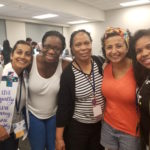The large, flat package was sitting in the front entryway when I returned home after three days away at an evangelical social justice conference. The return address listed “S. Gay” as the sender. It was a minute or two before I remembered placing the order. It was a print by a local artist, Shanequa Gay. I had learned of her work several months earlier, intrigued by this talented woman who shared my name.
I had ordered the print a week before the conference as an act of retail therapy. My spirit had been battered by a series of encounters with White (and often male) privilege. Three years of living, working, and worshipping in contexts where I was the only woman of color (or one of few) had taken its toll. For the first time in my racial reconciliation journey, I did not have a cultural safe space – an environment where I was surrounded by other people of color, where I did not have to carry the burden of representation alone.
I was tired of constantly being the “yes, but…” voice, the sole person providing an alternative perspective in rooms where people tended to look and think similarly. I was tired of constantly being in teaching mode, explaining how the world looks differently through the lenses of race and/or gender. And I was especially tired of being overextended by leadership roles and committee appointments that come with the territory when you fulfill multiple diversity checkboxes. It was a deep fatigue, one that seemed to emanate from my very soul.
Gay’s painting, “Reverence,” had spoken to my #Blackwomanweary soul. There was something inspiring in her depiction of five Black women arrayed in white and blue, bent down toward the ground with hands on hips. It evoked sass and sisterhood and love of God’s creation. Five Black women gazing downward, reverently, as if to say, “Our God is not way off in heaven somewhere. Our God is right here in this patch of ground.” It seemed as though they were turning upside down the gospel account of the woman with the hemorrhage (Luke 8:43-48). It was as if they were saying, “We may be bent, but not because we’re broken.”
Ironically, the conference had left many women of color bent and maybe even a little broken. The event had been a paradox of the promise and challenges of justice in Christian community. The organizers had gathered an impressive array of female leaders in racial and gender justice. One panel session featured Native-, Asian-, Latina-, and African-American women talking about racial reconciliation, a rare occurrence on a topic that is usually dominated by White and Black men.
But many of the names of the women of color had been omitted from the conference brochure and website. My name was included in a few obscure places, but incorrectly. As the conference unfolded, it became clear that women of color were almost exclusively featured as panelists, their wisdom reduced to soundbites. It became even clearer that we were not the audience that many of the speakers––including both the White women and the men of color––had in mind. On multiple occasions, we bristled at offensive comments and jokes made from the main stage, while the White brothers and sisters surrounding us cheered. At one point, even the call to prayer left us stumped about how we could participate. In a room filled with over two thousand Christians who cared about justice, we were not only a minority, we were culturally and theologically isolated.
To be a woman of color committed to racial reconciliation and social justice in the Christian church––whether evangelical or mainline––is to be a perpetual outsider. While we share many of the same concerns and experiences as our white sisters and our brothers of color, our existence at the intersection of race and gender brings unique experiences. Those experiences provide a unique vantage point from which to view the complex dynamics through which race, gender, class, power, privilege, and oppression operate. But they also predispose us to unique hardships in the struggle for justice in Christian community, hardships that make us want to quit, to walk away, and to give up on the hope for beloved community.
If any of us were looking for a cultural safe space, we didn’t find it in that auditorium. We found it instead on Twitter, as we began to carry on a separate, online conversation in reaction to what we were hearing. We found it in the lobby as we shared glances of recognition with women of color whom we didn’t know and hugs with those whom we did. We found it over shared meals, as we vented and processed and laughed and prayed together. By the end of the weekend, we were like the women in Gay’s painting, standing together in defiance and in hope, knowing that our ability to sustain the journey is borne not only of our baptism, but also of our sisterhood.
As an organization, CCDA has long recognized that the experience of Christian community development is not “one size fits all.” We have provided workshops and retreats that are specific to certain populations, including singles, married couples, parents, women, and people of color. This year, we are responding to the need for a cultural safe space among women of color in justice ministry by hosting a post-conference retreat where indigenous, Black, Latina, Asian-American/Pacific Islander, and multiracial women can receive support and sustenance for our journeys. The retreat itself is racially and gender restrictive, but we believe that its aims will benefit the cause of Christian social justice broadly. We invite our White sisters and our brothers of all races to support us through prayer and by reaching out to the women of color in your own communities who may be in need of this unique fellowship. Because more than you might know, many of us have considered quitting when the isolation gets to be enuf.
Chanequa Walker-Barnes
(Assistant Professor, McAfee School of Theology at Mercer University)
Learn more about the Women of Color CCDA Post-Conference Retreat.




